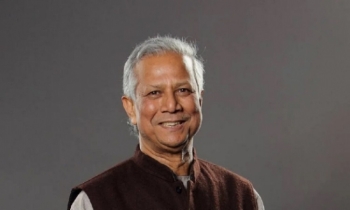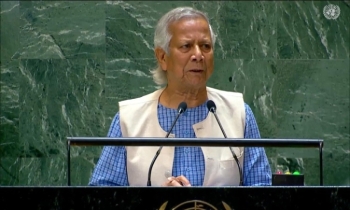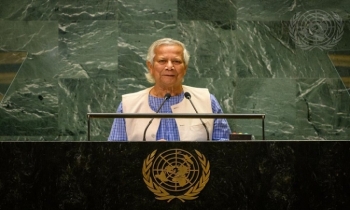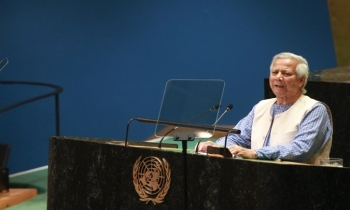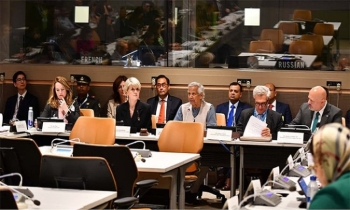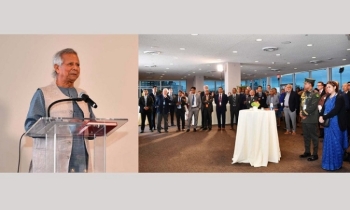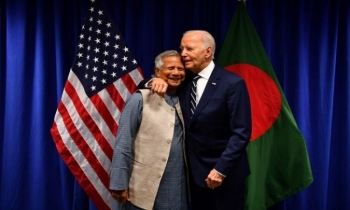National poet Kazi Nazrul Islam’s 124th birth anniversary today
UNB || BusinessInsider
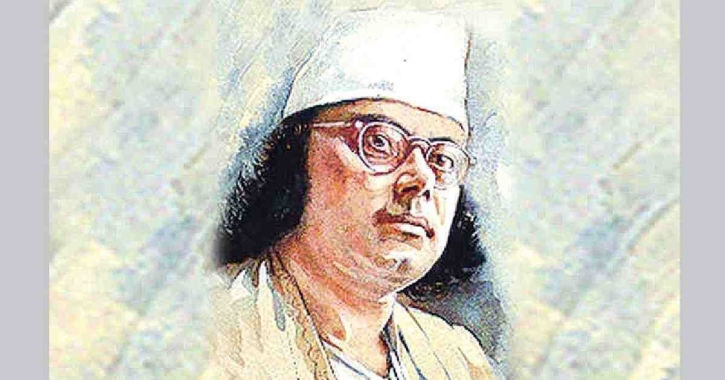
File photo
Thursday marks the 124th birth anniversary of the country’s national poet Kazi Nazrul Islam, known and regarded as the ‘rebel poet’ for his iconoclastic and majestic literary creations in several genres of Bengali literature.
Born in the Churulia village of Burdwan in the Indian state of West Bengal in 1899, Nazrul had inspired people to fight against injustice and repression through his fiery poems and other majestic literary creations throughout his career.
Different government and non-government organisations and cultural platforms are aiming to observe the day with separate programmes featuring cultural performances and discussions on the life and works of the revered literateur.
This year, the government has announced the theme of the birth anniversary celebration of the national poet as the ‘Agnibinar Shatabarsha: Bangabandhur Chetanai Shanitarup’.
The national poet’s birth anniversary will be observed in Trishal in Mymensingh, Doulatpur in Cumilla, Tewta in Manikganj, and Karpasdanga in Chuadanga and Chattogram, all of which are significant locations for the poet.
This year’s main celebration of the birth anniversary will be a three-day festival, set to be held at Darirampur of Trishal in Mymensingh, jointly organised by the Ministry of Cultural Affairs and the local district administration. The celebration is set to be inaugurated by the Deputy leader of the Jatiya Sangsad Begum Matia Chowdhury.
TV and radio stations including Bangladesh Television and Bangladesh Betar, alongside private television channels, will live telecast the inaugural ceremony and air special programmes and print media will bring out special supplements highlighting the 124th birth anniversary of the national poet Kazi Nazrul Islam.
Dhaka University teachers-students and officials-employees will assembly at the Aparajeo Bangla on the campus at 6.15 am and then place floral wreaths at the grave of Nazrul Islam near the university mosque led by VC Professor Md Akhtaruzzaman. A discussion will also be held there on the life and works of Nazrul with the Vice Chancellor in the chair.
Cultural institution Bangla Academy will pay respect to the national poet by placing floral wreaths at his grave near Dhaka University mosque and Nazrul’s portrait at Nazrul Mancha on the academy premises at 8 am on Thursday.
Chhayanaut, the country’s leading cultural institution is set to hold a two-day ’Nazrul Uthsab 1430’ from May 25 at the Chhayanaut Sangskriti Bhaban, Dhanmondi in the capital. The festival will be featuring performances inspired by Nazrul’s literature and songs at Chhayanaut’s auditorium at 7 pm on Thursday and 6:30 pm on Friday.
According to the Nazrul Institute, Kazi Nazrul wrote 2,600 songs, 600 poems, three novels, and 43 articles in a career spanning 21 years before losing his speech.
After the death of his father, Kazi Nazrul obtained a job as a caregiver and also worked as a muezzin at a mosque to support his family. At the age of nine, he had to drop out of school to join a Churulia-based professional ‘Leto’ company.
He was introduced to Bengali and Sanskrit literature while working for the group. He returned to school a year later and enrolled at Matharun English School, but dropped out again in Class VI due to poverty.
After a while, police officer Kazi Rafizullah took him in at his home in Trishal, Mymensingh, and enrolled him in Class VII at Darirampur School.
Serving the British Army in 1917 as a soldier, Kazi Nazrul started his literary career within a few years. His cult-classic poem ‘Bidrohi’ (The Rebel) was published in 1921. A year later, he started a fortnightly magazine named ‘Dhumketu’ (The Comet).
His nationalist participation in the Indian Independence Movement landed him in the hands of colonial British authorities on several occasions.
While in prison, Kazi Nazrul authored the ‘Rajbandir Jabanbandi’ (Deposition of a Political Prisoner), and his creations later encouraged Bangladesh Liberation War.
Freedom, humanity, love and revolution are the constant themes in Kazi Nazrul’s majestic literary creations. He was against all sorts of religious, caste-based, and gender-based discrimination and extremism.
Nazrul wrote short stories, novels and essays, but his songs and poems are his most critically acclaimed literary creations. He popularised Bengali ghazal melodies and is noted for his liberal usage of Arabic and Persian terms in his writings.
Kazi Nazrul created a new genre in music called ‘Nazrul Geeti’, a collection of 4,000 songs that he wrote and created the music for, many of which were recorded on HMV. Even after all these years, his songs are vividly popular in both Bangladesh and India, being modernised through platforms such as Coke Studio Bangla with songs such as ‘Bulbuli’ and ‘Darale Duaarey’.
In 1942, Kazi Nazrul began to lose his voice and memory due to an unexplained ailment. Later, a medical team in Vienna identified his illness as Pick’s disease, a rare and incurable neurodegenerative disease.
His family travelled to Bangladesh at the then-Bangladeshi government’s invitation and settled in Dhaka in 1972. For his iconic contribution to Bangla literature and culture, Dhaka University awarded him an honorary post-doctoral degree in 1974. He was awarded Ekushey Padak in 1976.
The rebel poet breathed his last in Dhaka on August 29, 1976.


